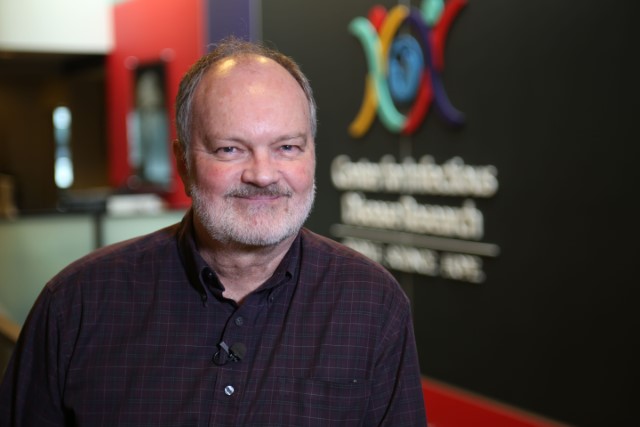
Rockhampton-born University of Queensland Science graduate Professor Peter Myler has won a major international award for his role in tackling infectious diseases afflicting the world’s poorest countries.
Professor Myler, who received his Bachelor of Science (Hons) degree from UQ’s Department of Biochemistry in 1977 (now a part of the School of Chemistry & Molecular Biosciences) and his PhD from UQ in 1982, for work conducted at QIMR Berghofer Medical Research Institute has won the BBVA Foundation Frontiers of Knowledge Award, in the Development Cooperation category.
Professor Myler is the Director of Core Services at the Center for Infectious Disease Research in Seattle, Washington.
His genome sequencing of parasites causing leishmaniasis and Chagas disease lays the groundwork for dozens of new therapeutic targets for future drugs and vaccines and treatments.
Head of UQ’s School of Chemistry and Molecular Biosciences Professor Paul Young congratulated Professor Myler on his outstanding achievements in the war against these neglected diseases.
“The parasites Peter’s career focuses on, Leishmania and Trypanosoma, cause the deaths of more than 100,000 people each year,” he said.
Cutaneous leishmaniasis, the most common form in humans, is estimated to affect half a million people per year, mainly in North Africa, the Middle East, North West India and China.
Trypanosoma cruzi is responsible for Chagas disease, which affects from six to seven million people, primarily in Latin America. Another variant, Trypanosoma brucei, causes sleeping sickness in Africa.
Professor Myler led the genomic sequencing of these parasites, a milestone reached in 2005, providing a “parts list” for hundreds of other research groups around the world to identify dozens of therapeutic targets for future vaccines and treatments.
At the Center for Infectious Disease Research (CIDR), he holds multiple roles which includes leading a consortium that applies the latest genomic and computational biology techniques to reveal the function of parasites at the molecular level.
A number of drugs now at the trial stage are a product of his contributions, although he cautions that reaching a real and lasting solution for these poverty-related diseases will be challenging, since parasites are constantly developing resistance to existing and new drugs.
“It can be hard to raise support for research on diseases that many people have not heard of,” Professor Myler said.
“I am fortunate to work alongside and collaborate across disciplines with a great cadre of colleagues here at CID Research and from around the world who are also dedicated to finding solutions to infectious diseases.”
Professor Myler is also Director and Principal Investigator of the Seattle Structural Genomics Center for Infectious Disease (SSGCID). In 1993, he was appointed as Assistant Professor in Pathobiology at the University of Washington, where he is currently an Affiliate Professor in the departments of Global Health and Biomedical Informatics & Medical Education, and a member of the Pathobiology and Molecular & Cellular Biology graduate programs.
He shares the Development Cooperation award with Spanish scientist Pedro Alonso, whose work focuses on reducing mortality rates of malaria through vaccines and insecticide-treated bed nets.
According to the BBVA Foundation, the award recognises the “importance of multi-pronged, complementary strategies, like those deployed by the laureates,” in addressing the complex burdens caused by infectious disease in developing countries.
Five previous winners of the BBVA Foundation Frontiers of Knowledge Awards have subsequently won Nobel Prizes.
To learn more about the research, watch these videos:
Peter Myler Interviewed by BBVA Foundation
BBVA Foundation Frontiers of Knowledge Award Development Cooperation 2017



